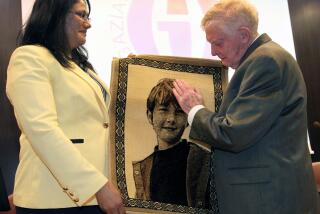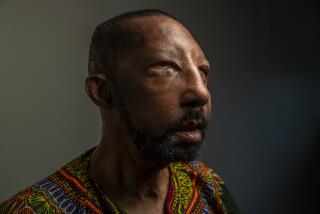Health Problems Take a Holiday at Transplant Camp
- Share via
ANZERE, Switzerland — Hannah Swift had a heart transplant six years ago and then was struck by cancer. Ryan Walker’s kidneys failed. Phillip Bates needed new lungs as an infant and now hopes for one of his stepfather’s kidneys.
And George Best’s liver simply gave out after years of alcohol abuse.
“We’re all family, really,” former soccer star Best, 56, told a crowd at a winter camp for children who have had transplants. “We’re all living thanks to someone else’s organs. Every day is a bonus.”
Not that there was much time to dwell on health problems. Days were packed with skiing, snowboarding, sledding, diving, fencing and paragliding in the Swiss Alps.
The Tackers camp made its debut with 40 children last year. This year’s weeklong session attracted some 100 children plus their families from all over Europe, North America and Australia.
It was the brainchild of Liz Schick, an English-born resident of Anzere who received a transplant to replace a cancerous liver in 1998, and Brian Fraser, a native of Sydney, Australia, who spent six years on dialysis before getting new kidneys six years ago.
Fraser hopes to run a surf camp for transplant kids in Australia -- “tackers” is Australian slang for small children.
The aim of the camps is to allow the children and families to have fun and draw strength from their common experiences.
“It’s just great,” said Lacey Wood, 13, of Sacramento, who had a heart transplant when she was 18 months old. She enjoys dancing, volleyball and basketball, and is a drummer in her school band.
Asked what she enjoyed most about the camp, she said with a grin: “Dancing, staying up all night, snowboarding, that sort of thing.”
The organizers also hope to draw attention to the chronic shortage of organ donors, which results in agonizing waiting lists and unnecessary deaths.
In the United States, more than 80,000 people are signed up for transplants -- 53,600 of them for a kidney and 17,100 for livers. Each day, 63 Americans have a transplant, but 16 die while waiting for a suitable organ, according to U.S. government figures.
In most countries, people have to give explicit prior permission -- usually by carrying a donor card -- for their organs to be used in the event of sudden death. Only a handful of European nations have procedures allowing organs of accident victims to be transplanted automatically if the family does not object.
Speed is of the essence, but medical staff are often reluctant to approach grieving families within minutes of a death to ask permission.
Terinda Bates, an American intensive care nurse, said she used to recoil at the task -- until she adopted an abandoned baby with a severe cleft palate who needed a lung transplant after sucking baby formula into his lungs. “Now I’m the first to jump out and ask for organ donations.”
She blames ignorance in the medical profession and the public for the constant shortage. “I didn’t even realize they did lung transplants until Phillip needed one,” she said.
Phillip, 10, now has kidney failure. He was discharged from the hospital so that he could travel to the camp. Upon his return to Brandenburg, Ky., he is scheduled to return to into medical care. His adoptive father was being tested to see if his kidney would be suitable for transplanting to Phillip -- a person can lead a relatively normal life with only one kidney.
Similar stories abounded at the camp, although the kids themselves were matter of fact, laughing about spiders in the bedroom and karaoke competitions rather than wallowing in self-pity.
Hannah Swift, from Newcastle, England, had a heart transplant six years ago. In 2000, she was diagnosed with cancer of the lymph glands -- an indirect result of the transplant. Doctors gave her three weeks to live, but she was offered a long-shot, powerful chemotherapy treatment that worked.
She needs regular hospital checks and takes a daily cocktail of drugs needed to boost her immune system against cancer without making it so strong that it will cause rejection of the stranger’s heart pulsing within her body.
Although the drugs have a variety of side effects, including facial hair, gum disease and weight problems, Hannah’s skin and teeth gleamed as she pronounced her ambition to be a beautician.
The star of the slopes was Liam Walker, a mischievous 6-year-old from northern England who hurtled into every activity, was in the thick of all the snowball fights and got tangled in the reins of the Siberian huskies pulling a sled.
Liam received a kidney transplant just over a year ago after a two-year wait during which he was hooked up nightly to a dialysis machine. His brother, Ryan, now 10, had a kidney transplant four years ago.
The siblings suffered progressive kidney failure because of a rare genetic disorder that affects one in 80,000 people.
George Best’s suffering was self-inflicted.
The boy from Belfast, Northern Ireland, was signed by Manchester United when he was 15. He scored 180 goals in 465 games and is widely regarded as the greatest goal-scoring wing in soccer history. He was European player of the year in 1968 and went on to star in the old North American Soccer League.
Off the field, Best was his own worst enemy. His drunken exploits on the club scene provided daily fodder for Britain’s tabloids.
Because of his hard drinking, his liver failed. His legs were swollen, his skin yellow. He was prone to pneumonia and infections, and he was constantly tired, said his second wife, Alex.
Best received a liver transplant in July and has a stomach implant that will make him sick if he drinks alcohol.
Still frail, he said he is firmly on the path to recovery. He relishes the success of his autobiography and his return to work as a newspaper and television soccer commentator.
He wants to pass on some advice: Carry a card that you want to donate organs in the event of sudden death and make sure that your family knows your wishes.
“Why take an organ to heaven?” he said. “It really is an amazing gift to someone: the gift of life.”
More to Read
Sign up for Essential California
The most important California stories and recommendations in your inbox every morning.
You may occasionally receive promotional content from the Los Angeles Times.












